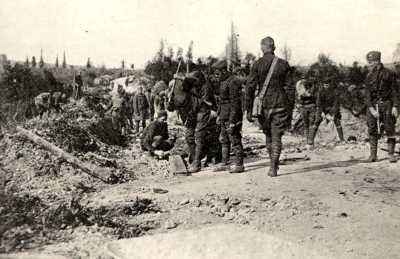Army Engineers in WW1
Engineers building roads in the Argonne Sector
National Archives Photo
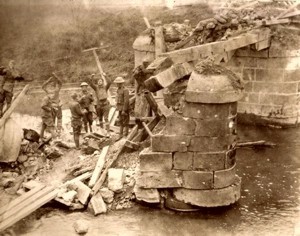
Engineers stringing communication wire over a destroyed bridge
National Archive photo, Courtesy of Indiana War Memorial Archives
Army Engineers in WW1
When the United Stated entered the war in April 1917, there were only 3,000 enlisted engineers. By the end of the war in November, 1918, the demand for their expertise had required the services of almost 400,000 engineers. The Engineers were in charge of repairing the devastation of the war to expedite troop movements such as surveying, bridge and road repair, constructing buildings, maintaining communication lines, removal of land mines and "booby" traps, digging trenches and constructing shell, gas and splinter-proof shelters, providing clean water and constructing or removing barbed wire.
They also launched gas attacks, built hospitals, barracks, mess halls, stables, target ranges, and repaired miles of train tracks. Their extensive and time consuming duties left them little time for rifle practice and drills and they were not relied upon for frontline combat, but the success of the Allied forces depended upon the support of the Engineer Corps.
309th Engineer's Flag WW1
Indiana War Memorials Archives
The 309th “Lincoln Division”
Organized to Camp Taylor and consisted primarily of men from Indiana and Kentucky. The division was broken up in LeMans France and the Engineers served as training instructors for the front like combat divisions.
Editors note: See "11th Month, 11th Day, 11th Hour, Armistice Day, 1918, World War 1 and Its Violent Climax" by Joseph E. Perscio
for other stories about the unnecessary lives lost in the hours before the Armistice. 2004, Random House
Stories from the front lines:
The following stories were taken from post-war interviews of the returning veterans conducted by the Indiana Historic Commission over ninety years ago.
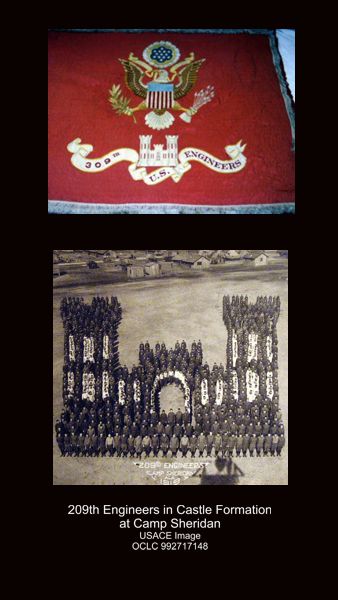
Bernard Thomas Kelly, Co D, 7th Regiment, US Engineers
Marion County, Indiana
Silver Star: "...displayed exceptional bravery during the successful construction of pontoon bridges over the Meuse River and canal east of the river. In the face of heavy and direct machine-gun and artillery fire they constructed their bridges, and by reason of their coolness, determination, and utter disregard for personal safety, the Infantry was able to cross the river and canal and capture the important heights east of the Meuse."
Albert John Lambert, 108th Engineers, Ripley County, Indiana
“Work of Engineers was to build bridges across the Meuse, build roads, dig trenches, put up barbed wire entanglements, dig dugouts and dressing stations. Also, cut wire entanglements of the enemy with pliers and blew them up when necessary. Went ‘over the top’ in charges.
“A mistake in orders on the night of November 10, 1918, sent two regiments ‘over the top’ near Metz without a protective barrage fire. They were caught by uncut barbed wire. The enemy fired with machine guns, determined not to let their supplies of ammunition stores be captured since the Armistice was on the point of being signed. This mistaken attack resulted in the loss of about five hundred American soldiers.
“Luxemburg is German in character and sympathy was pro-German until after the Armistice.”
Editors note: See 11th Month, 11th Day, 11th Hour, Armistice Day, 1918, World War 1 and Its Violent Climax by Joseph E. Perscio for other stories about the unnecessary lives lost in the hours before the Armistice. 2004, Random House
Charles Thomas Butler, Engineer Corps, Marion County, Indiana:
21st Engineers, (L. R.) Special Regiment, authorized to construct, maintain, operate a light railway from railheads to trenches. “I reported to 1st Div. headquarters, Menil La Tour, France, February 8, 1918, with 23 men (Gen. Robert Bullard, Commander). We were bombarded by German aviators that night. From the above date (in the Northwest Toul sector) I never left the front until I was given a leave January 11, 1919. Left German border, March 20 6, 1919. Regiment repaired highways, LeMans area, until May 15, 1919.”
Alfred Peter Poorman, Captain, Engineers, Tippecanoe County, Indiana
“Reduced weight from 165 to 145 pounds, half through exercise, half through dysentery caused by bad meat. Candidates, most of whom are college graduates, with from two to 15 years practical engineering experience, and many of whom were already commissioned as Lieutenants Captains and Majors but not ordered to active service, were treated by the West Point officers in command as though they were of the same class as the old regular army enlisted men.
“Am still in favor of universal military service if it could be placed in charge of some agency other than the West Point graduates in the Regular Army”
Era L. Patterson, Private, Co. E, 7th Engineers, 5th Div. Grant County, Indiana
Enlisted September 21, 1917. Trained a short time at Fort Thomas. Sent to Fort Leavenworth, Kansas. Sailed the first of March, 1918. Went into action at once, when not working for engineers was going over the top with infantry. Has been in many engagements. When in the Engineers, 5th Div., they were under heavy fire during their construction of bridges. They build the last Bridge over the Meuse River, standing in water to their chins. Private Patterson was gassed and went through many hardships. After the signing of the armistice, with sent to Rumalang, Luxembourg and kept there until he sailed for the United States in July, 1919. After landing, with sent to Chillicothe, Ohio for treatment in hospital. Is still very nervous. Received discharged, August 21, 1919.
“The 7th Engineers laid the last Bridge over the Meuse River under heavy shellfire until the last shot was fired. When not doing duty as Engineers, was going over the top with the infantry.”
Leslie Clarence Hague, Co. B, 16th Engineers, Marion County, Indiana
Worked with the British Army at Armiens. Double tracked RR with Canadian Army, establish terminal at Marcy. Replaced and rebuilt, railroad from Verdun to Sedan.
Information from Indiana Historical Collections:
Walter Levi Baer,
Silver Star General Orders No. 15, Headquarters 5th Division, A. E. F., Army Post Office No. 745, June 9, 1919. The following officers and enlisted men are cited in orders for distinguished conduct in action . . . Corporal Walter L. Baer, Company F, 7th Engineers.
During the entire period of activity at the front of his organization, this soldier on duty as motorcycle driver for the battalion commander displayed unswerving loyalty and exceptional devotion to duty particularly marked during the days and nights of November 4, 5, and 6, when he drove almost continuously under fire, leaving his machine and delivering messages on foot when necessary, and assisting materially throughout the reconnaissance and construction of the heavy pontoon Bridge at Dun-sur-Meuse . . . By command of Major General Ely: C. A. Trott, Chief of Staff. Official: David P. Wood, Lieutenant Colonel, Infantry, Division Adjutant.
Record: Born September 5,1898,
Lee Glenn Winslow, K. I. A., Grant County, Indiana
Lee enlisted saying he felt his duty to do something for his country. Was converted after entering the service, saying “Don't worry about me, if the Germans get my body, they won't get my soul, for I have given it to the Great Father’s keeping”
He was helping build a road over which food and ammunition had to go that evening. His officers wrote saying “We laid Lee tenderly away between Souain and Somme Py.”
He left a Father, Mother, two brothers, two sisters and one half-brother to grieve for him.
Manuel Redman Floyd Jr., Master Engineer, Engineers Corps, Tippecanoe County, Indiana
Entered service Dec. 12, 1917. Stationed at Columbus. Ohio. Sent to American University, Washington, D. C. Sailed for oversea service in March, 1918. Was sergeant before going to France and was later promoted to Master Engineer. Jr. Stationed for some time in France and was later transferred near Bordeaux, on the Spanish border. During his service he states that his shift of 30 men sawed 91.188 feet of board and his battalion made the record of all the A. E. F. of Engineers. Saw service on the Mexican Border with Co. L. 19th Infantry, in 1912, command of General Funston. Born in Washington County, (Indiana) Nov. 29, 1893, son of Mrs. Clara Floyd. Home is Route K, Lafayette, Ind.
Harold Leslie Clegg, 24th Engineers, Special Regiment, Marion County, Indiana
“During the Meuse-Argonne Battle, I was pumping water to the men on the front-line when a German shell exploded just as I went back to see how much water was in the tanks. I was covered with mud and water, but escaped with no personal (injuries) miraculously. There was nothing left of the engine piston ring.”
Stanton William McCready, Engineers, Marion County, Indiana
Help put in sewer plant and Camp Taylor, also made Camp Shelby, was at Camp Shelby for one year.
Oscar B. Howard, Casual Co. 2, Engineers, Decatur County, Indiana
“I was honorably discharged from the United States Army. As Testimonial of Honest and Faithful Service, doing my duty the best I could, having a good character and clear conscience.” Signed Oscar B. Howard.
Your content goes here. Edit or remove this text inline or in the module Content settings. You can also style every aspect of this content in the module Design settings and even apply custom CSS to this text in the module Advanced settings.
Letters home from John Moone, Co. F., 21st Engineers,
American E.F. (Photo and letters sent by his family)
To: His sister Jessie Anderson, 2909 Station Street, Indianapolis
As he enlisted on February 10, 1912, and this is concerned with going over to France, this letter must have been written in the winter of 1912.
Dear Sis:– I think you will be disappointed when you get his letter because you said you expected a long one. We have plenty write about, but we are not allowed to write what we would like. We had a fine trip over from the States and not many cases of seasickness. I was not sick and was sure glad, for judging from the cases of it I saw, it must be terrible. The weather was pretty cold the first few days out but we hit the Gulf Stream and it was warm so you see we fared better than I expected. We had two or three submarine scares but there was nothing to any of them. One of the gunners on our boat was given credit for sinking a submarine but I don’t think anything more than a large fish was seen. We stayed on board ship about five days after we dropped anchor in one of the ports of France and everyone was disappointed for we expected to land as soon as we arrived. We saw quite a large part of France on our way to the place where we are now camped. I wouldn’t care to travel much in Europe for their railroad equipment isn’t quite like what we are used to in the States. The coaches are about large enough for six persons. Two in each compartment. As it was, we had eight in each compartment. I have been taking hikes around the country since we have been here. The cooks who are not on shift get passes every other day, and I sure have been taking advantage of them. I got a letter from Harry the other day and he said that the Red Cross sent one of the fellows in his company a woolen outfit. He mentioned in the same statement that it was hotter than that well-known place. B.V.D.’s would have been more appropriate. Well, Sis, if I write more this time I won’t have anything to write about next time so will say good Bye. With Love. John. P.S. I smoke Camel Cigarettes.
(Censured) O.K. Harry Feehauf Lieutenant Enqus. U.S. AFFrom: John MoonTo: His sister, Jessie Anderson, 2602 Gale Street, IndianapolisSomewhere in France, June 12, 1918
Dear Sis– It has been a long time since I wrote to you and of course I am ashamed of myself. I am not sure whether I wrote to you since arriving here or not. We are at the front now but are not in any danger. The big guns are all around us and we are lulled to sleep at night by the sound of the firing. This is a very quiet sector just at present. We are in the province of Lorraine and in what is called the Lorraine sector. We have a little excitement about every day. The German planes come over our lines and the anti-aircraft guns always fire at them. I have seen two of them brought down. The first one came down in “no Mans Land,” and the second came down back of our lines. He came down in flames and it was some sight. The observer either fell out or jumped out when the machine was about two thousand feet from the ground and the pilot stayed with the plane and was burned to death. Some of our fellows went over and got some pieces of the machine for souvenirs. A Frenchman brought a german machine down pretty close here this morning. We had a field meet and ball game here for Decoration Day. We have a ball game about every evening. Well, sis, this is my limit so give my regards to Mack and tell him to write and tell me what kind of conditions they have in the yards there. Good Bye John.
From: John Moone, Co. F. 21st Engrs., American E.F. via New York
To: His sister, Jessie Anderson, 2137 Wheeler Street, Indianapolis
Somewhere in France, July 3, 1918
Dear Sis– We are having big times around here in the shape of air raids. They have been over for four nights straight and I suppose they will be over again tonight. I hope not though for they sure do spoil a man's sleep. About fourteen bombs were dropped the first night but I only heard the last two. It happened about three forty-five and when I woke up I mentioned to my bunky that they were getting pretty close and I wondered if we would have to move. Just about that time, one landed just back of my head, at least it seemed that way to me, and I grabbed my clothes and left. I would have been just as well off if I had stayed in bed for it was all over when I got out. I used to lie in bed and listen to see where they were hitting but I don’t do that now. I learned my lesson when that bomb hit so close. It was only a small, twenty-five pound bomb and hit about one hundred feet from me but it sure did shake the dirt on me. Last night the alarm was given but no bombs were dropped close to us. Night before last I got up and started to put on my shoes and I got my right shoe on my left foot. I started to change it but just then another one bursted pretty close, so I put the other shoe on. I found that they fit pretty good on the wrong feet when a man is in a hurry. We have a cellar under us that is bombproof, so you see we are pretty safe if we get the alarm in time. Whenever a German plane comes over at night all the bells in town are rung and they also blow a siren. It makes a fellow feel funny to wake up in the wee hours of the morning and hear them. It sounds like New Years eve in the States. Very little damage has been done since the raids started. One fellow just asked another one what time he thought we would have to get up tonight. Some of the fellows have moved their bunks down below so they can get a good nights sleep. We are going to have a pretty good dinner on the fourth. I mean a pretty good dinner for being at the front. We re going to have roast beef and brown gravy, creamed peas, mashed potatoes, bread, butter, coffee, and pumpkin pies. We have to make seventy pies. That will be some job. I made fourteen pumpkin pies yesterday for some of the fellows. I always make them come across with a pie, whenever I make them. I got three yesterday. Well, Sis, I am going to try and get some sleep before Fritz comes over so will say Good Bye John.
Lt. G. Waterbury, 1st Lt. Engineers
From: Cook John Moone Co. F. 21st Engineers, American E.F. Via New York
To: His sister, Jessie Anderson, 614 North Keystone, Indianapolis
January 29, 1919, Conflans, France
Dear Sis– This is the first letter I have written to you for about three months and I am not very proud of the fact. To tell the truth, I have only written about six or seven letters since the armistice was signed. We were near Varrenes, at a small place called Baulny when I last wrote to you. Since then we have had a hard time getting paper. Since coming to France we have moved around quite a bit but have only seen the war-torn part of it. We landed at Brest and then went to Jonchery, a small town about six kilometers from Chaumont which is General Headquarters for the A.E.F. From Jonchery, we went to Baccarat which was the training sector for American troops. Things were pretty quiet when we first went there but before we left things got pretty lively. We were quartered in a large glass factory, about the largest I think, that there is in Europe. We experienced our first air raid while in Baccarat. Since then we have experienced quite a few and it sure is a grand and glorious feeling to see the stars shining and know you won’t be bombed. We used to curse clear nights. From Baccarat we moved to Sorcy where our headquarters was located and from there to Menil la Tour, a small town near Toul. We operated narrow gauge there, hauling rations, ammunitions, and guns during the St. Mihiel Drive. We were then moved to Varrennes, where the Argonne drive started and from there to Baulny, from Baulny to Senuc, near Grand Pre, and there is where we were when the armistice was signed. We all thought we would be sent home as soon as the narrow gauge work was done but we were put up here, operating standard gauge railroad instead. Here we are and here we will no doubt stay for quite awhile. We have tumors of going home in February or March but there is no foundation to them. I’ll tell you Sis, I wanted to get over here but I didn’t want to get over near as bad as I want to get back. If I ever get back to the States, the Statue of Liberty will have to turn around if she ever wants to see me again. Well, Sis, I am going to hit the hay so will say good night and Good Bye
With Love
Jack
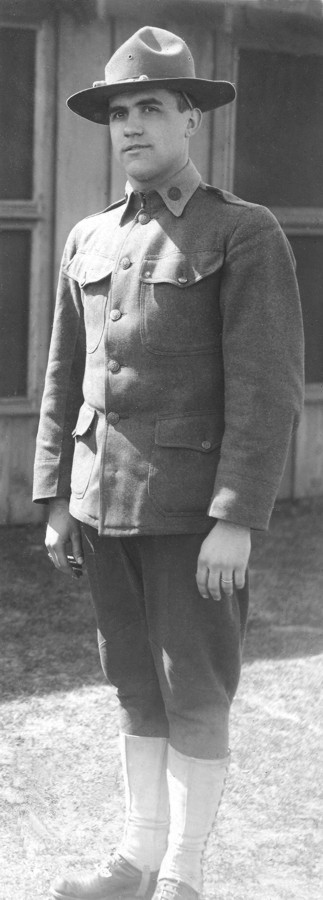
John Moone
Co F, 21st Engineers AEF
From: John Moone Co. F. 21st Engineers
To: His sister, Jessie, Mrs. Mac Anderson, 614 N. Keystone Ave., Indianapolis
February 15, 1919, Conflans, France
Dear Sis, I don’t know how long it has been since I wrote to you but I expect it has been long enough. We don’t have much to write about except the weather and it is rotten. We have had some pretty cold weather for the last couple weeks but it started raining last night and it turned warm today so I guess winter is over. I sure hope so for these open work houses we live in are pretty chilly. We are living in a hotel that was used by the Germans and most of the windows are gone. We are moving in a couple of days to a place about a mile from here. We go into some old German stone barracks that has a large stone wall around them so I guess we will have to use wings to get out, once we get in. That means that we are going home for we are going to drill as soon as we get over there. Every outfit has to do a certain amount of drill and we sure are going to get ours. I think we will be in the States by the first of April. I hope this talk of getting home in April is not an April Fool joke. I am taking so much stock in these rumors that if they don’t come true I will go loco. This letter is pretty short but it seems as though I can think of nothing but home so I will tell you all about it when I get there. Good Bye With Love. John
Censored Roy L. Grogan, Lt. Corps of Engineers
From: John Moone, Co. F., 21st Engineers, American E.F.
To: His sister, Jessie (Mrs. G.M.) Anderson, 614 Keystone Ave., Indianapolis
March 9, 1919, Labry, France
Dear Sis, You need not watch the papers to see when the 21st Engineers is coming home for we are in no division and there is not much chance of the papers printing our arrival. They may take enough interest in us to do so but I don’t think they will. I should worry though for we are under orders now and we expect to lave for the port of embarkation next week. This is straight dope. Believe me, Sis, we have waited long enough for this move and it seems as though I can hardly wait for these next last few days to pass. I am still in the kitchen, trying to please a bunch of railroad men in the way of food and let me tell you it is an impossibility. Never again. I hope I may never see a kitchen again. It is easy to be seen why so many old army cooks blow their heads off. This regiment has been drilling pretty hard since we moved up here from Conflans and the fellows have done fairly good. They realize that the better drilled they are the easier it will be to pass the inspectors so they are going at it without even kicking which is something unusual, for railroad men would kick at most anything. Well Sis, you needn’t answer this for I have hopes of being on the water by the time it gets to you so Good Bye With Love, John
![ENGReal-photo postcard of a photograph of U.S. Army soldiers building a pontoon bridge over a body of water at Fort Bragg, N.C., around the 1920s [circa 1920s]. ENGReal-photo postcard of a photograph of U.S. Army soldiers building a pontoon bridge over a body of water at Fort Bragg, N.C., around the 1920s [circa 1920s].](https://wwvets.org/wp-content/uploads/2020/08/ENGReal-photo-postcard-of-a-photograph-of-U.S.-Army-soldiers-building-a-pontoon-bridge-over-a-body-of-water-at-Fort-Bragg-N.C.-around-the-1920s-circa-1920s..jpg)
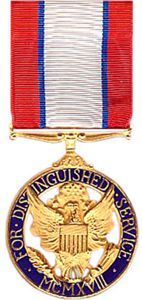
Real-photo postcard of a photograph of U.S. Army soldiers building a pontoon bridge over a body of water at Fort Bragg, N.C., around the 1920s [circa 1920s]. US Army Signal Corps photo
James Gillespie Blaine Lampert
PLACE OF BIRTH: Oshkosh, Wisconsin
HOME OF RECORD: Oshkosh, Wisconsin
James Lampert graduated from the U.S. Military Academy at West Point, Class of 1910.
AWARDS BY DATE OF ACTION:1 of 1
Earl Sylvester Passwaiter, 34th Engineers, Marion County, Indiana
The 34th engineers were a “take” outfit, the men having been transferred from the different camps in the country to us, and it consisted of 24 companies or about a brigade. We were unassigned to a division or Army hub but worked as an independent unit.
William Fred Taylor, Co. C., 29th Engineers, Marion County, Indiana
Additional information relating to the work of the 29 Engineers at the front can be obtained by writing to Washington or E. Hinman, Astoria, Oregon where a book was published giving the complete history of this organization.
The unit was divided into smaller units in stationed along the entire American front and at times worked with both the British and French forces. Part of their work consisted of securing information as to enemy activities, locating batteries, mapmaking, and general observation. Internally pulls were located between the artillery first-line trenches, were connected with certain divisions, being attached to various. During my stay in St. Mihiel sector was with various divisions, 5th, 7th, 26th, 28th, and 79th.
Howard Sebring Smith, Engineering Corps, Ripley County, Indiana
“Service, 7 months in France, 5 months in Russia, Murman Coast and south into the interior some 600 miles. Less than 1,000 men in the United States saw service in both France and Russia.”
Jack Conley Thurston, Co. C., 34th Engineers, Marion County, Indiana
Meuse-Argonne offensive, October 8, 1918; Etain, October 1, 1918; Sedan, November 6, 1918
Gassed at Etain about 6 miles from Verdun, France, about November 1918.
“Placed on detached service in September as member of the Railroad Transportation Department, Convoy Branch. Convoyed quartermaster, ordnance, engineer, and medical supplies to the front.
List of countries and cities visited: France: Bordeaux, Paris, Marseilles, Lyons, Toul, Nancy, Verdun, Nice, Brest, Tours, Perigieux, Beaune, Dijon, St. Dixier and other small towns.Belgian: Liege and other smaller towns. Germany: Coblentz, Cologne, Montibar, Wirges, Trieves, and smaller towns. Italy: Province of Turin Spain: Biarwitz Africa, Oran, Gibraltar, Azores England: Liverpool, Manchester, Birmingham, Ramsey and Southampton.
Spent three months in the AEF University at Beaune, Cote d’or, France in the College of Fine and Applied Arts.
Harry Harrison Gault, 17th RR Engineers, Ripley County Indiana
discharge records notation:
“The 17th Engineers with the 12th, 13th, and 14th Regiments paraded in Linden on August 15, 1917. These regiments of railway engineers were the first American troops that had ever paraded in Linden, and the first foreign troops that had marched through Linden for more than 500 years.”
Harry S. Zufall, Pvt. Engineers, Croix de Guerre, Tippecanoe County, Indiana
Lee Glenn Winslow, K. I. A., Grant County, Indiana
Lee enlisted saying he felt his duty to do something for his country. Was converted after entering the service, saying “Don't worry about me, if the Germans get my body, they won't get my soul, for I have given it to the Great Father’s keeping”
He was helping build a road over which food and ammunition had to go that evening. His officers wrote saying “We laid Lee tenderly away between Souain and Somme Py.”
He left a Father, Mother, two brothers, two sisters, and one half-brother to grieve for him.
Earl Coffer, Telegraph Operator, Decatur County, Indiana
“Telegraph operator on US military lines in France. Stationed at LeHavre, France. Relayed traffic between American mission and the American Embassy in Paris through transatlantic cables. Original of first message between States and American Mission stating that Germans would sign, dated 23rd, June 1919 now in my possession.”
Letter home from American YMCA stationary
"On active service with the American Expeditionary Force"
Cpl. C O Gossett, Co. C., 113 US Engineers, AEF APO 793
April 20, 1919, Uruffe, France
Dear Eugene,
This is Easter night and I must confess a rather lonely one, as there is nothing to do and I can't go anyplace because I am non-com in charge of quarters today, and I must stay around the barracks.
You will probably wonder where Uruffe is located. It is about 20 km south of Toul and is one of the thousands of little villages in France. We have a very nice camp, for a camp in France, at the edge of the village. The worst trouble is the mud, but you find that everywhere in France and after nearly 7 months, I am used to it.
Now, to answer some of your questions. As for an early return home, I at present, see no chance of getting back earlier than August, but as you know, strange things happen in a very short time in the Army and there is a mere possibility of an earlier return. By the time you get this letter, we will probably be in Germany, for some units of the division are already on the move. We work some repairing roads, drill a little, and perform the necessary camp duties and loaf the rest of the time.
Answering where I had been since being in France is a long story if told in full, so I'll tell the most important places. We landed in Brest, October 28 and were quarantined there a month for spinal meningitis. This is beyond a doubt, what saved us off the front lines. We were sent from Brest, at last, to a village near Dijon and put on some structural work. At the time the armistice was signed, we were a ways South near Lyons, building a rest camp. Lyons is sure some fast city or rather fast people stay there.
Christmas, when Wilson and Gen. Pershing revived the Army Corps at Langres, we were their repairing roads. After this, we were assigned to the 7th division, for our division, 38th, had gone home, and were sent up above Toul near the old Hindenburg Line, in the St. Mihiel sector, and we are still up here around Toul but not so close to the old front as we were. I haven't the control of the English language enough to try to describe the devastation about 30 km north of Toul. About a month ago, I was on a seven-day leave on the Mediterranean, going through Marseilles and spending the seven days around Menton. While here, I was over the border in Italy, visited Monte Carlo and the casino there and the great resort, nice. This is the Palm Beach of Europe. We saw here, for nothing, what hundreds of people spent thousands to see, and stayed at the best hotels, Uncle Sam paying the bill. I also spent a day in the Alps on a donkey.
I have prayed for a Kodak, but they would not let us bring ours across, and you can hardly buy them over here, to say nothing of supplies. I have collected a few souvenirs, but very many of them bear down on a hike, and I have seen so many things I want, I have ceased to appreciate the value of them.
I'd sure have hated for you to go over and get picked off, but if you had ever gotten here and gotten through the scrap, you would indeed be proud of the experience. I sure would not take anything for what I've seen or experienced. I have not seen or heard from George G. I have inquired of every Aero Squadron I see if he is in it, never have found him. I also have written for his address, but never have gotten it. Yes, I smoke a pipe and some cigars when I can get them, but nix on the cigarettes. With no ice cream, cakes etc. and so little candy and so little to occupy spare time, a pipe is rather companionable.
As for the French girls, to h--- with them. Because the girls are dirty and very undesirable for the Americans, who are used to a different economical conditions and the city girls that we see, for the most part, are disgustingly immoral, even to the most immoral American you see. I'll tell you more about them when I get back. Of course, there are a few decent girls, but very few, using the American girls as a standard. Don't worry, none of them will ever get the better of me. I have too much respect for myself and some others.
My plans on returning are to get to college “tout suite” and take up civil engineering. I am hoping to get home, so as to start in college in September, but it is uncertain as yet. I have been following civil engineering ever since I have been in the Army, and I like it fine. I see the need of a college education now, more than I ever did.
I sure would've liked to have been at P. H. and M. A. O's wedding. I sure wish them all the success and happiness in the world.
I got a long letter from Lowell the other day. He is doing fine at IU, so he says. I wrote Olive a letter not long ago and sent it to DP. I have since heard the news she is not at DP anymore. You must not get sore, for that is the first letter I have written your “mar Cherie”, and she wrote to me first. It is almost time for me to check quarters, as it is a quarter of an hour till taps, so, so long.
Ever your friend, Cecil
"The thousands of engineer troops that served in France in 1917 and 1918 contributed both to front-line and rear-support efforts. The combat engineers constructed bridges, roads, and narrow-gauge railroads at or immediately behind the front. The forestry troops of the 20th Engineers produced roughly 200 million feet of lumber in France. Other engineer troops enlarged French port facilities, constructed more than 20 million square feet of storage space, and built 800 miles of standard-gauge rail lines, plus an equal distance in yards and storage tracks.
The technically trained engineers organized the first U.S. Army tank units and developed chemical warfare munitions and defensive equipment. So important were these pursuits that in 1918 the War Department created a separate Tank Corps and a Chemical Warfare Service, the latter headed initially by an engineer officer."
https://www.usace.army.mil/About/History/Brief-History-of-the-Corps/World-War-I/
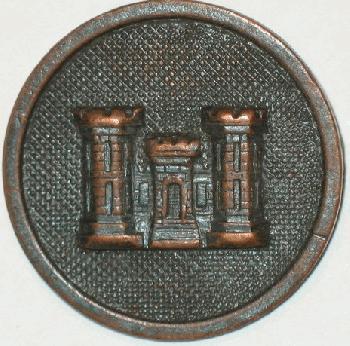
6th US Engineers
WW1 Uniform Button
First Americans to come under German fire.
http://www.oldmagazinearticles.com/FIRST_AMERICANS_TO_FIGHT_IN_ww1#.XxMrsShKg3s
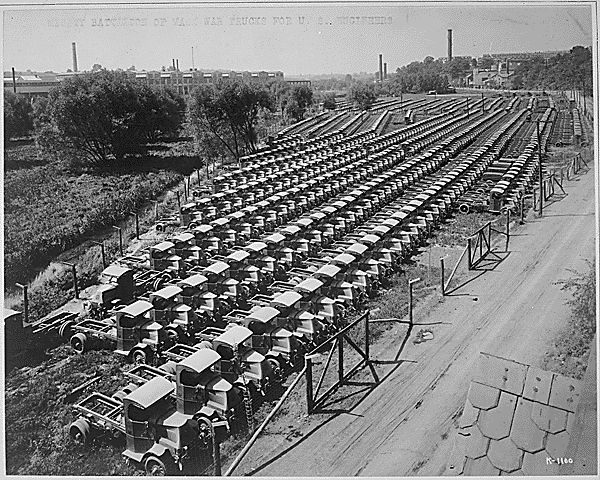
Ethics of Art
A mighty battalion of Mack war trucks, all for the Engineers Corps. Manufactured by the International Motor Company, Allentown, Pennsylvania.
National Archives Photo
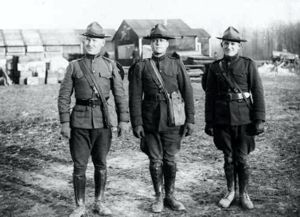
11th Engineers
American enlistees of the 11th Engineers Regiment who fought with the British on the Cambrai Front, near Péronne, 12-5-1917.
(National Archives Identifier 16579361)
MASTER ENGR. SR G
16 ENGRS.
January 12, 1919
THE DAILY NORTHWESTERN (OSHKOSH, WISCONSIN)
01/27/1919
DIES IN THE SERVICE
Oshkosh Man in Army Engineer is a Victim of Pneumonia in France
Pneumonia proved fatal in France to Fred S. Conley of Oshkosh, after he had gone through the war without an injury. Relatives here have received official notice that he passed away in that country on the date of January 12. He was thirty-two years of age and was a master engineer in the Sixteenth Regiment of American railway engineers in the army. Mr. Conley had been an engineer in the building of bridges to Montana and in Canada.
And in Canada, two such structures which he erected were blown up by German agents. When the war broke out he was studying law at Detroit and although over the draft age, he enlisted in the army before finishing the course, planning to return after the war and get his degree. A letter written by him was received by his mother and sister here the day after the date on which he died and in this he wrote of his anxiety to get home again, now the war had ended, as his ambition to cross the Atlantic had been realized and he come through the struggle in France without a scratch.
Mr. Conley was born at Watersmeet. Mich. His home here was at 602 Tenth street, where his mother, Mrs. Olive Conley, resides with her daughter, Mrs. Charles Engles. In addition to the mother and sister mentioned, the young engineer is survived by two brothers in the military service, Lieut. Edward Conley of the signal corps and Roy Conley, electrician on the submarine destroyer Panther of the United States navy, also a brother, Vincent, at Stevens Point, and a sister, Mrs. John Anheuser, of Green Bay. The deceased was a student at Williams Business college in this city in 1904 and 1905. He went to Europe on one of the early trips of the Tuscania, later torpedoed by a German submarine. and had been active in engineering constructive work when the American army was following the retreating German army just previous to the signing of the armistice.
